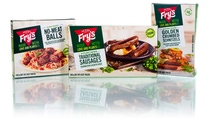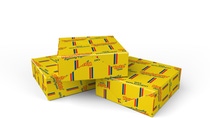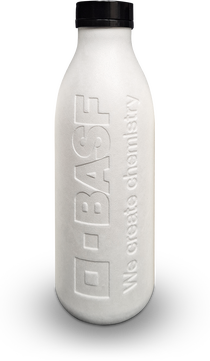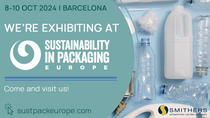Newsletter Resins & Additives for Printing & Packaging
Achieving circularity with water-based barriers and biomass materials ‒ join us on a round trip
Strenuous efforts to improve environmental compatibility and reduce carbon footprint are driving progress in the packaging world. We at BASF are highly committed to supporting the industry in achieving its sustainability goals. We want to help our customers find solutions, including for more challenging applications such as molded fiber packaging. Our new products reduce the use of plastic, and our novel processes based on renewable resources allow you to replace fossil-based materials. Read on to find out more about these new technologies and discover how some companies that are using our products have won awards for their developments.
Water-based barriers make paper packaging a viable choice
Joncryl® HPB water-based liquid barriers for paper can help you adopt paper-based materials in a wider range of packaging solutions by enabling you to cut down on the use of fossil-based plastics. In this way, you can make your packaging fully repulpable, while minimizing waste. Liquid barrier polymers also allow replacement of other non-sustainable products such as polyfluoroalkyl substances (PFAS) and paraffinic waxes, thereby directly enhancing the sustainability of packaging.

Here are some examples of how Joncryl® HPB barrier polymers can assist you in converting to environmentally sounder solutions.
SealGlobal.Co® specializes in customized and globally commercialized coatings for sustainable packaging applications. Thanks to the company’s expertise, global brand owner Fry’s Family Foods has been able to use paperboard printed and coated in-line with FreezeKote®/FastSeal® water-based barrier coatings to replace non-recyclable printed paperboard laminated with plastic film on both sides. The simplified process not only promotes circularity, but also reduces downtimes.
In July of this year, SealGlobal.Co® received a Wordstar Global Award for development of the new, more sustainable Fry's frozen food packaging.


In 2023, the company also won the Gold Pack Silver Award for its patented KandyKote® water-based technology, which replaced hot wax in confectionary paper wrappers with a barrier coating, enabling paper to be recycled. This system also ensured leaner and faster processes with an overall reduction in energy consumption.
In cooperation with BASF and Scitech Adhesives, packaging technology company Pulpex has developed a new, sustainable, moulded fiber solution for bottles as an alternative to plastic and glass. The patented and scalable technology from Pulpex preserves product functionality, while allowing end-of-life circularity, and is ready to be deployed globally. Brand owners such as Unilever, Castrol, and Kraft Heinz have expressed interest in this new approach. This year, Pulpex, Scitech Adhesives and BASF won the Royal Society of Chemistry’s Innovation Through Partnership Prize in UK.

Renewable raw materials help lower carbon footprint
And that’s not all! There are many more ways in which we can support you in improving sustainability: BASF’s solutions can help you achieve circularity in packaging, lower your PCF, and meet your environmental goals by cutting down fossil resources through the use of renewable raw materials, biomass balance or ChemCycling® based binders.
All the products in our Joncryl® range are designed to help lower your carbon emissions.
The Joncryl® BRC line, for example, contains 50 to 64% bio-renewable raw materials, allowing you to cut down on the use of fossil resources in water-based inks and varnishes, and reduce PCF by up to 60%.
Joncryl® MB (Biomass Balance) products make use of renewable resources as feedstock in the very first steps of chemical production. The bio-based feedstock is allocated to specific products using a certified method. The MB concept can be applied to any Joncryl® product available in our portfolio, binders for barrier coatings and heat-seal lacquers included. Without compromising on quality or performance and without the need to change your production setup, you can help bring greenhouse gas emissions down significantly, sometimes all the way to net zero*.
Fossil resources can also be saved and circularity supported with BASF’s ChemCycling™ approach. This enables the use of recycled plastic waste in the mainstream production processes by converting it to a pyrolysis oil, which can be allocated to specific products by applying a certified method.
Find out more at Sustainability in Packaging, October 8-10, in Barcelona
During the conference, we will show how to effectively reduce the fossil resources used in the production of water-based inks and coatings. We will also explain how PCF reductions can be achieved by applying the BASF ChemCycling™ approach. And we will present the water-based Joncryl® HPB range of liquid barrier polymers with the aid of finished paper packaging solutions, including more challenging applications such as flexible packaging.



